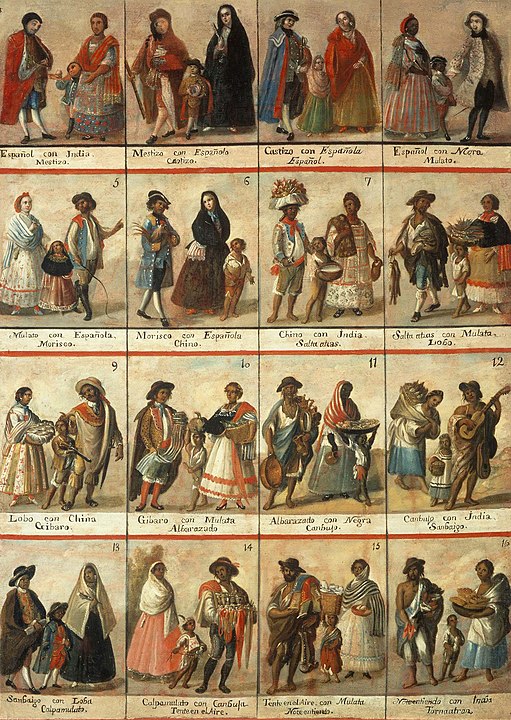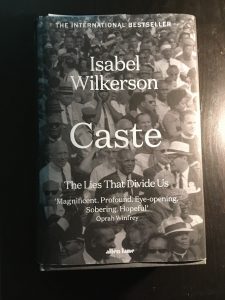“Caste – the Lies that Divide Us” by Isabel Wilkerson

That is the thing with definitions, be they of word, phrase or more complex description; beyond the essential vocabulary and grammatical rectitude, precision is rarely absolute and very often determined by context; imbedded in society, geography and time.
One such word that provides an interesting example is ‘caste’. As an Anne with an ‘e’ like she from Green Gables, and having always been uncompromisingly for its quiet but firm closing presence both in word and speech, I have blithely accepted caste so spelt to have just one definition, and that firmly rooted on the Indian sub-continent and descriptive of the system of social stratification that has existed there since ancient times. Now, of course, it turns out to be infinitely more complex than that, even when specific to Indian society, but the etymological route from the Latin castus ‘to be cut-off, separated’ through to the Portuguese casta meaning ‘breed or race’ and adopted by – and complicated by – the British Raj is clear. That the very ordinary and malleable word cast is strongly associated is equally so (though a matter to which I have not previously given thought!) – always somehow to do with throwing together, throwing away – a troupe of players (cast of characters); iron (cast-iron); a fishing line; a dice (literally, and metaphorically as in iacta alea est; the die is cast) And then there are all those who are cast out, away; who are downcast, typecast.

Not wishing to cast aspersions (to stay with my train of thought!) on Oprah Winfrey, but when a tome comes my way emblazoned with “Magnificent. Profound. Eye-opening. Sobering. Hopeful” my antennae begin to twitch nervously. Be that as it may, I said here that I would read Isabel Wilkerson’s 2020 book Caste: The Lies That Divide Us (as my copy is titled), and I have, and so give here a few of my thoughts.
Only now after reading Caste and upon reflection, has it occurred to me that Wilkerson also used that terminology in her 2010 bestseller The Warmth of Other Suns; though, I think, sparsely and without particular emphasis, nor can I remember that she specifically explained her choice of vocabulary. Of course, I may be wrong on this, but on any account it is obviously a means of framing race that she has mulled over for a relatively long period, and one that she thought needed refining and deserving of its very own book. This I am not so sure of; I would even contend it even muddies the waters.
And, this is not to say that I didn’t find Caste an interesting enough read; for despite the objections I have – and there are a few (or maybe many!) – and however dissatisfied I was in the conclusions drawn by the author, Wilkerson is a very good writer and journalist, who can weave the factual with anecdotal to present the narrative that she very well wants to tell, and in the interests of a firmly held point of view and, furthermore, in an accessible style well suited for popular consumption. Perhaps here lies the crux of my criticism – the author, it seems to me, was so intent on telling her one version, that she has not even attempted to identify faults in her argument or to consider whether her reasoning may be inadequate or does not lend itself to generalization (across vast expanses of time and place). And as colorful as they sometimes may be, her more personal micro-narratives with typical micro-aggressions at their core have a tendency to aggravate. Now I can’t be sure, but who hasn’t been pushed, shoved, insulted, etc., by some dude on a plane (though I’ve never had the luxury of first class!), or felt out of place or ignored in a crowd, and my irritation hasn’t been lessened by reflecting upon interviews that Wilkerson has given in the last year or so in which the same anecdotes are rattled off. That’s okay, but one has to wonder what she thinks they add to her argument, other than presumably offering up herself as an example of the subordinate caste. As a highly successful, Black American woman of renown, fair or not, that premise rests on shaky ground. When I say this, I don’t wish to diminish the sensitivities of those who are subjected to or slighted by everyday racism, or sexism, or both, it is just that I think when putting forward an argument, or espousing a theory, sometimes it is better to stand back – a little less subjectivity is more.
On a fundamental level, I have to say I struggled with Wilkerson’s ‘update’ of an ancient caste model to expound her own “eight pillar” theoretical framework, one in which racial discrimination is inherent, and racial purity and allocation of labor constrained within each hierarchy is aspired to. And, to then whittle this down to the existence of a rigid three tier caste system in the United States; one in which the white majority in all their, presumably homogeneous, glory reigns on high, a Hispanic and Asian middle struggles to ascend – whereby the very possibility of doing so is antithetical to a caste construction, and a Black minority, relegated (and by virtue of their skin color alone) to the lower caste. The result is, in my opinion, a much too simple reading of the dynamics at play in a modern society driven by capitalism; Wilkerson’s absolute decoupling of race from capital fatally ignores the latter as the ultimate “pillar” (to use her language) in supporting – perpetuating – racial inequities in the United States.
Continue reading …